by M. C. Jennings | Mar 7, 2024 | Academics, Careers In..., COBA Faculty, College Decisions, Current Students, Dukes School of Finance, Financial Management, Uncategorized
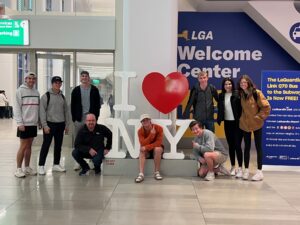 Most trips to New York City involve plenty of sightseeing, tours, shows and musicals, and expensive trips to some of the world’s best restaurants. They don’t usually involve sit-down meetings with some of the top financial minds in the country. But that was the design of a trip to New York last fall for eight students in ACU’s Dukes School of Finance.
Most trips to New York City involve plenty of sightseeing, tours, shows and musicals, and expensive trips to some of the world’s best restaurants. They don’t usually involve sit-down meetings with some of the top financial minds in the country. But that was the design of a trip to New York last fall for eight students in ACU’s Dukes School of Finance.
Those students – seven of whom are in the first cohort of the Dukes Scholars – were led on the trip by Dr. Jonathan Stewart, professor in the Dukes School of Finance. Stewart has been taking students to New York for several years, allowing them to visit some of the top financial institutions in the world and ask questions of the leaders of those companies to find out what it takes to make it in New York.
Stewart and his students were in New York from Oct. 18-22, visiting with leaders from Bank of America, Evercore, Court Square Capital Partners, Tiger Global Management, RBC Capital Markets, and Goldman Sachs. They toured Nasdaq and met with some of the leadership of the second-largest stock exchange in the world. They also met with a panel of young professionals in the finance industry who are members of the Manhattan Church of Christ.
“We had an opportunity to encourage and inspire those students to work in New York or another financial center,” Stewart said. “It’s all happening there (in New York), and we put our students in front of many talented people on the trip.
“We have a lot of students interested in investment banking, so going to Goldman Sachs and Royal Bank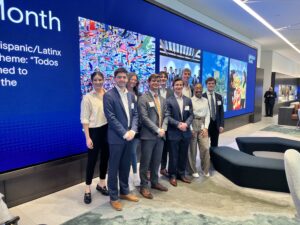 Canada (RBC) was great for them,” he said. “We went into RBC, where they set us up in the conference room, and we had people talking to us who were dealing in high-level investments and acquisitions daily.
Canada (RBC) was great for them,” he said. “We went into RBC, where they set us up in the conference room, and we had people talking to us who were dealing in high-level investments and acquisitions daily.
“Our students were able to interact with a wide range of people who had made a career out of that field, but also some in the room who were just a year or two older than our current students,” Stewart said. “That gave them a chance to interact with and ask questions of someone close to their age.”
Kaylee Smoot, a native of Corona, California, who will graduate in May with her Master’s in Accounting, said the time spent with executives of some of the top financial institutions in the country was invaluable.
“That time was priceless,” Smoot said. “We heard from many executives, including from specialized private equity firms and international finance companies, and even received a tour of the Goldman Sachs Headquarters. We had students ranging from first-year to graduate level, and we were each able to walk away with invaluable knowledge about what opportunities awaited us in our future careers.”
 Stewart said he always gets help from ACU alums in the financial industry, using their connections and contacts with industry leaders in New York to set up the trip. One of those ACU graduates who helped this year was COBA alum Steve Swinney (‘94), based in Colorado and the CEO of Kodiak Building Partners who tapped his contacts in New York to meet with students from his alma mater.
Stewart said he always gets help from ACU alums in the financial industry, using their connections and contacts with industry leaders in New York to set up the trip. One of those ACU graduates who helped this year was COBA alum Steve Swinney (‘94), based in Colorado and the CEO of Kodiak Building Partners who tapped his contacts in New York to meet with students from his alma mater.
Swinney said he hoped his contacts showed the ACU students all that is possible for them in finance.
“The Dukes School of Finance at ACU is a tremendous opportunity for finance students to have so many career doors opened to them that maybe they haven’t had in the past,” he said. “I wanted them exposed to all that is possible for them. They must know their ACU education is preparing them for great things. We need excellent Christian finance leaders in the business world.”
A crucial part of the trip for Stewart and Smoot was discussing how faith and business mix. Stewart said that while making connections was paramount for the students, allowing those students to see that faith and high finance can mix was just as important. That’s why the panel with professed Christians who are also leaders in the financial industry was part of the tour. The time shared at Manhattan Church of Christ was to ensure the ACU students left New York knowing their faith wouldn’t be trampled in the City That Never Sleeps.
“Taking your faith into the business world might look different in New York than it would in Abilene or Dallas because there are so many perspectives and different points of view in a big city than in a place like Abilene,” Stewart said. “But to see there’s a place for Christian businessmen and businesswomen to function and contribute and be part of that world was, hopefully, a healthy opportunity for our students.”
Dallas because there are so many perspectives and different points of view in a big city than in a place like Abilene,” Stewart said. “But to see there’s a place for Christian businessmen and businesswomen to function and contribute and be part of that world was, hopefully, a healthy opportunity for our students.”
Smoot, who hopes to secure a financial analyst position in Dallas after graduation, said those conversations were the most important to her on the trip.
“In recent decades, we have seen the damage immoral and unethical behavior can do in the finance industry, with many people’s livelihoods still suffering the consequences,” she said. “To receive an education that equips you with the knowledge to be successful in finance while grounding you with Christ-centered values strengthens your chances of being a light for Christ in a world and industry that desperately needs it.
“We already see an example of this in the STAR course offered at ACU, a student-managed investment fund I had the honor of leading last semester,” Smoot said. “We are exposed to real-world dilemmas involving not only the quantitative side of the stock market but also the qualitative side of the finance industry as we discuss the financial and ethical motivations behind different investments we make on behalf of the university.”
New York City comes with preconceived notions, from the friendliness of its citizens to the high cost of living to safety. But by sitting down with those industry leaders, touring Nasdaq, taking in a show on Broadway, going through the 9/11 Museum, and giving the students time to explore the city, Stewart said he hopes the students began to see New York in a new light.
 “We wanted the students to make real connections, and when you have eight students sitting in a room with three or four investment bankers, that’s a great opportunity,” Stewart said. “They had a real chance to talk to them, to exchange business cards, and network. There are so many stereotypes of New York, but it’s one of the world’s great cities, and having the experience of moving around and riding the subway and seeing the landmarks and everything that goes along with New York City was so much fun to share with those students. We see the cutthroat part of the financial industry in the movies and on TV all the time, and some of that is probably true. But many people are out there doing things the right way and have a faith background and a belief system, and they put that in action every day.”
“We wanted the students to make real connections, and when you have eight students sitting in a room with three or four investment bankers, that’s a great opportunity,” Stewart said. “They had a real chance to talk to them, to exchange business cards, and network. There are so many stereotypes of New York, but it’s one of the world’s great cities, and having the experience of moving around and riding the subway and seeing the landmarks and everything that goes along with New York City was so much fun to share with those students. We see the cutthroat part of the financial industry in the movies and on TV all the time, and some of that is probably true. But many people are out there doing things the right way and have a faith background and a belief system, and they put that in action every day.”
And for Smoot, putting some of those preconceived ideas to rest was just as important as anything else she took away from the trip.
“When you think of Wall Street, you may imagine exhausted employees working 100-plus hours a week, day trading at a giant corporation that becomes their only identity,” she said. “I’m happy I walked away realizing that while the finance industry in New York does require hard work and long hours, those individuals still have a life. And many of their companies offer impressive on-site benefits to assist with the burden long workdays may exert on them. It makes someone’s dream of working on Wall Street shift from daunting to doable, as long as you are willing to still chase after it.”
And each trip Stewart leads helps to re-energize him, he said.
“I love going to New York and being in the middle of everything,” said Stewart, who thanked Swinney, David Swearingen, and Jim Litton (‘01) for their help in setting up the schedule of tours and visits. “It’s the heart of the financial world, especially in our country. I learn something new on every trip, and I come back energized, inspired, and thinking about ways I can incorporate what we’ve learned on the trips into what we’re learning in the classroom. It inspires me to stand in front of our students and encourage them to dream big and do what they want to do because they can make it happen. We are fortunate to have many people here and ACU friends and family willing to help make that happen.”
Swearingen, and Jim Litton (‘01) for their help in setting up the schedule of tours and visits. “It’s the heart of the financial world, especially in our country. I learn something new on every trip, and I come back energized, inspired, and thinking about ways I can incorporate what we’ve learned on the trips into what we’re learning in the classroom. It inspires me to stand in front of our students and encourage them to dream big and do what they want to do because they can make it happen. We are fortunate to have many people here and ACU friends and family willing to help make that happen.”
by M. C. Jennings | Dec 20, 2023 | Academics, Accounting, Alumni Spotlight, Financial Management, Uncategorized
written by special contributor, Lance Fleming

Linebacker Jack Gibbens #50 of the Tennessee Titans during the preseason game between the Tennessee Titans and the Chicago Bears at Soldier Field on August 12, 2023 in Chicago, IL. Photo By Emily Starkey/Tennessee Titans
As a double major in accounting and financial management, Jack Gibbens’ (‘20) learned a lot about discipline and tenacity during his time in the College of Business as a student-athlete. That steadfast determination was something he’d need on the road to the National Football League, which wasn’t as smooth as that of others he plays with as a member of the Tennessee Titans. But in the NFL – as Gibbens has heard over and over – it’s not about how you got to the league, it’s about what you do when you get there.
And despite being cut at the end of the Titans’ training camp in 2022, the former ACU Wildcat standout has finally earned his spot in the league as a starting linebacker for the Titans. He’s started all but one game this season for the Titans after playing in the team’s final five games in 2022.
Gibbens was a standout at ACU from 2017-20 and then spent his graduate season (2021) as a starting linebacker at the University of Minnesota, where he was an honorable mention All-Big Ten Conference selection and earned his master’s degree in accounting. He wasn’t drafted in 2022 but signed as a free agent with the Titans after the draft, and for most of training camp, it looked like he might make the final roster.
He quickly became a favorite of head coach Mike Vrabel, who dubbed him “Dr. Gibby” because of his intelligence. The former ACU Academic All-American had made an impression on the veteran head coach.
“He’s smart, answered all the questions, and then said, ‘Coach, I wasn’t in pre-med,’ “Vrabel said. “I told him I knew and that it was a joke.”
Gibbens has spent his career – both in college and now as a professional – using his athleticism and intelligence to reach the pinnacle in football: a starting spot in the NFL. A native of Bulverde, Texas, Gibbens quickly earned a starting spot for the Wildcats and played in 39 games over four years, earning all-conference honors and academic All-America accolades.
He went through the Titans’ training camp in 2022 but was one of the final cuts made before the regular season started. He was re-signed to the team’s practice squad on Sept. 12, 2022, and was promoted to the active roster on Dec. 10, 2022, making his NFL debut in their Dec. 11 game against Jacksonville. Just one year later, Gibbens is a mainstay in the middle of the Titans’ defense, having earned a starting spot over other veterans.
“Coach Vrabel continually preaches that it doesn’t matter how we got here; it’s what you do when you get an opportunity,” Gibbens said. “It’s been a journey to get to this place in my life. I was cut last year and then spent some time on the practice squad before I finally got an opportunity to play. Now, I’m playing a completely different role as a starter. I’m trying to keep the same process, which is to put my head down, keep working, and get better every day.”

Photo by Jeremy Enlow/Abilene Christian University
We recently had the chance to catch up with Gibbens, who spoke about his time at ACU (where he carried a 4.0 grade point average in accounting and financial management) as well as what he’s learned about managing his money in the NFL.
Q: You spent a lot of time in the Mabee Business Building while at ACU. Could you tell me about your experience in COBA and your gratitude for what you learned under those professors?
Gibbens: “When I think about my time in COBA, I am most appreciative of the amazing people I was surrounded by each day. The small class sizes allowed me to get to know my classmates and professors on a more personal basis. I am extremely grateful to my professors not only for teaching me about business but for their interest and investment in me as a person.”
Q: What are some of your biggest takeaways from your time in COBA?
Gibbens: “Probably learning how to combine business with my personal beliefs, interests, and values. Being in a Christ-centered environment was a huge blessing that allowed me to be myself and grow in knowledge and as a person.”
Q: When you think back on your time in COBA, who are the professors that stand out, and what life lessons did you take away from them?
Gibbens: “I had many professors who impacted my life, but two in particular stick out. Clint Buck had a huge impact in making it feel like home. He taught my first class at ACU and made me feel at home on campus by developing a personal relationship with me and praying for/ with me as I adjusted to college. And Andy Little. I appreciate the way he challenged my thinking and pushed me to form and defend opinions.”
Q: How difficult was it to balance getting ready to play a game on Saturday and studying to maintain a 4.0 GPA?
Gibbens: “Balancing those two was a challenge when trying to succeed at the highest level. Being a student-athlete taught me great lessons about time management and work ethic. I quickly learned the importance of being in the moment and fully investing myself in the task at hand.”
Q: When you played at the University of Minnesota, how much more difficult was the dual life of student and athlete?
Gibbens: “The adjustment from high school to college was much more difficult than my transition to Minnesota. Adjusting to life as a collegiate student-athlete is so different athletically, academically, and in everyday life from when you were in high school. Moving to Minnesota was much easier because I had already learned how to be successful in that lifestyle.”
Q: Now that you’ve moved into the NFL, with your background and major, how much are you watching your finances and where your money is going?
Gibbens: “Having a background in accounting and finance has caused me to have a huge interest in my finances. What I studied in college gave me a great foundation to make good financial decisions and understand the importance of budgeting, investing, and preparing for life after football.”
Q: A lot of guys in your position turn it over to a financial advisor and then don’t know anything about it. Did you determine early on you weren’t going to do that?
Gibbens: “The NFL is unlike any other profession because it creates specific challenges and opportunities from a financial perspective. To help me navigate this unique financial landscape I have hired a financial advisor who specifically works with athletes and understands my specific needs.”
Q: Going back to your ACU days: what did ACU and the experiences in COBA, football, and student life in general mean to you?
Gibbens: “Those times at ACU are some of the best years of my life. I made memories and friendships that I will carry with me for the rest of my life and, for that, I am extremely grateful for ACU.”
by M. C. Jennings | Sep 25, 2023 | Academics, Careers In..., COBA Faculty, COBA Staff, College Decisions, Current Students, Financial Management, Professional Development, Uncategorized
Written by special contributor, Lance Fleming
It probably doesn’t happen often that an intern working at an insurance company during the summer calls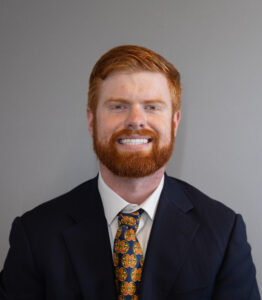 the best part of that internship the chance to improve his communication skills. But for ACU senior finance major Will Fargason, that was his favorite part of working during the summer for S-S Bendure Hartwig, one of the fastest-growing firms representing American Income Life branch of Globe Life Insurance.
the best part of that internship the chance to improve his communication skills. But for ACU senior finance major Will Fargason, that was his favorite part of working during the summer for S-S Bendure Hartwig, one of the fastest-growing firms representing American Income Life branch of Globe Life Insurance.
Based in Columbus, Ohio, S-S Bendure Hartwig has been one of the top workplaces in Columbus from 2013-21, as selected by Columbus CEO magazine. Fargason spent the summer working remotely, meaning most client interactions came via Zoom meetings. Not exactly the best way to communicate, but for Fargason, it helped him work on his interpersonal skills.
We recently caught up with the native of Lubbock to get some insights on his summer spent working as an insurance agent for S-S Bendure Hartwig.
Q: What was your favorite part of the internship?
Fargason: Being able to speak with the clients daily through Zoom calls. We communicated and tried to figure out the best possible plans for those people to be able to live their lives and not worry if they were to pass away, how their kids’ lives would be affected.
Q: What are the most significant lessons you learned in your internship?
Fargason: The greatest lesson I learned was not taking anything for granted. The conversations I had with clients and learning about their financial or physical situations reminded me how blessed I was to be in a position where I had a fantastic internship opportunity and could help other families find what was best suited for their needs at that time.
Q: How do you see this experience aiding you in the future?
Fargason: This experience will significantly help me in the future because, throughout this internship, I exponentially increased my communication skills. Talking to clients daily and through complex topics has helped my vocabulary and ability to catch different vocal cues to ensure I communicate as effectively as possible.
Q: Do you have any tips for future interns or students looking for internships?
Fargason: Apply for every internship that seems remotely interesting. I never knew exactly what I wanted to do, and being able to do an internship allowed me to see if this field was something I enjoyed and wanted to continue.
Q: How has your time at ACU prepared you for this internship and for future employment?
Fargason: My time at ACU has helped me through the various preparation applications they have provided me and throughout my classes, learning everything I would need to help me in the business world. Being taught by professors with their doctorates and at the highest level of education has been an enormous blessing for me to be prepped for life and work after college.
Q: What’s been your most memorable experience as a business student at ACU?
Fargason: The opportunity to grow professionally while still in school. The business school has many opportunities to meet high-class business people and learn everything you want about life after college. This opportunity to learn from people who have been successful in their fields and have chosen to come back to campus to share what worked for them and how we could be successful is something I’ve enjoyed.
COBA seeks to develop connected, inspired, and equipped business and technology professionals who honor God and bless the world through:
-
- Distinctive programs
- Lifelong relationships
- Pathways for impact
To learn more about the College of Business at ACU, click here.
by M. C. Jennings | May 5, 2023 | Academics, COBA Faculty, Current Students, Faith Infusion, Financial Management, Management, Outcomes, Research, Social Entrepreneurship, Student Spotlights, Uncategorized
Written by special contributor Lance Fleming
Each day, students across the ACU campus display the university’s mission to educate students for Christian service and leadership throughout the world through their actions and acts of service on the campus. Each year, students like those are nominated by their academic departments. From those nominations, 50 scholars are selected by the ACU Faculty Senate to receive the University Scholars Award for their graduating class.
Among those 50 scholars who demonstrated outstanding scholarship by maintaining a grade point average (GPA) of 3.5 or higher, earning 90 hours towards their degree, and continuing the pursuit of knowledge in their research field, seven are students from the College of Business Administration. The COBA students who received this year’s University Scholars Award are Kathryn Crawford, Gracie Isham, Matthew Roberson, Will Harris, Diego Lozano Welsh, Ben Blackmon, and Garrett Powell.
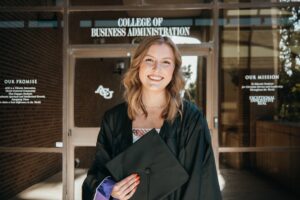 We will highlight each of the seven over the next month, including this profile of Kathryn Crawford. A native of Flower Mound, Texas, Kathryn carries a 4.0 GPA and is graduating with a BBA degree double majoring in Financial Management and Management with a concentration in Leadership. After graduation, she will travel this summer and serve as a Resident Advisor for the Leipzig Study Abroad program.
We will highlight each of the seven over the next month, including this profile of Kathryn Crawford. A native of Flower Mound, Texas, Kathryn carries a 4.0 GPA and is graduating with a BBA degree double majoring in Financial Management and Management with a concentration in Leadership. After graduation, she will travel this summer and serve as a Resident Advisor for the Leipzig Study Abroad program.
Kathryn is a member of Sigma Theta Chi and participated in Sing Song with her club each of the last two years. As a freshman, she was in Sing Song and directed a Freshman Follies Hall act. She also volunteered at Palm House as a freshman and sophomore and worked in the Lytle Center for Faith and Learning.
Kathryn recently answered a few questions about her time at ACU and in COBA, covering everything from her most influential class to the most unique thing she’s been a part of while at ACU:
Q: What is the most important thing you’ve learned about yourself at ACU?
Crawford: “I grow the most when I am challenged. Even though it can be difficult, pushing myself out of my comfort zone has been pivotal to my development personally, academically, and spiritually.”
Q: What professor or class has impacted you most and why?
Crawford: “The class that impacted me most at ACU was International Business. I had the opportunity to take this course abroad during my junior year when I spent a semester in Leipzig, Germany. I not only learned how countries engage with one another, but I was also able to experience first-hand how businesses operate outside the United States. Touring companies such as BMW and Leipziger Messe allowed me to gain a new perspective on the possible operations and organizational structures of businesses in a way that would not have been possible in a traditional classroom setting. I came to appreciate cultural collaboration and international business through this course and plan to pursue this area more in my future career.”
Q: What has been your experience in COBA?
Crawford: “For someone who didn’t know exactly what she wanted to do entering college, I could not have ended up in a better place to explore my passions and cultivate my skills than COBA. Surrounded by encouraging faculty, I uncovered new areas of interest each year. The support I experienced from a few specific professors, such as Dr. Jody Jones, helped me find my affinity for research and ignited a desire to continue my education beyond a bachelor’s degree. With unique courses such as social enterprise consulting and S.T.A.R., I immersed myself in real-life situations that forced me to apply classroom concepts to actual projects. Most importantly, I will walk away most grateful for the integration of faith into every single aspect of my experience from my time at ACU. Between equipping courses like Leadership Summit and the consistent spiritual encouragement from my professors, particularly Dr. Marquardt, I was exposed to an incredibly unique experience. I leave ACU well-rounded and equipped to enter life as a young professional with confidence only possible from the strong foundation in knowledge, faith, and purpose that COBA cultivated.”
Q: Of all the things you’ve experienced at ACU, what do you believe will have the most impact on your life?
Crawford: “My semester abroad will have the most impact on my life. This experience gave me a new perspective on the world around me and my role in it. I came to appreciate living outside my normal, everyday comforts and continually found myself enamored by the cultural nuances surrounding me everywhere I traveled. It solidified my ability to love and appreciate my neighbors regardless of their customs, traditions, or beliefs. I hope that I never stop seeing the world with the awe and wonder I felt during this time, and I pray that God will use that for his glory wherever life leads me.”
by M. C. Jennings | Oct 20, 2022 | Academics, Accounting, Alumni Spotlight, COBA Faculty, COBA Staff, Current Students, Digital Entertainment Technology, Financial Management, Human Resource Management, Management, Management Information Systems, Marketing, Placement stories, Professional Development, School of Information Technology and Computing, Uncategorized
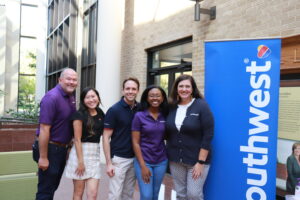
COBA Alums who work at Southwest Airlines recently came to discuss internship opportunities at the company with COBA students. Pictured from left to right are Chris Grubbs (’95), Kristy Ng (’20), Baron Smith (’09), Bethani Culpepper (’19), and Katie Coldwell (’00).
Written by special contributor Lance Fleming
When the College of Business Administration (COBA) unveiled the most significant changes to its curricula in decades, one area of great emphasis was professional development. Those studying the updates and later making the recommendations believed a professional internship would help make COBA students more well-rounded prospective employees when they left ACU.
As Dr. Brad Crisp, the Dean of the College of Business Administration said recently, “… we are placing greater emphasis on professional development by requiring a professional internship in management, marketing, and information systems and offering an internship as an option for accounting and finance majors.”
As the person serving as the director of professional development and internships for COBA, Jasmine McCabe-Gossett said the new emphasis on internships will help make students better equipped to handle real-world practices that they will face when they begin working full-time.
“Students need to take advantage of the unique timing internships can offer,” said McCabe-Gossett, who is in her first year as the Professional Development and Internship Director for COBA. “Students have the distinct opportunity to apply what can feel like abstract theories and case studies to the real world. Internships are insulated and allow students to practice in an environment designed for them to ask questions and fail, whereas, post-graduate opportunities can be far less forgiving.”
first year as the Professional Development and Internship Director for COBA. “Students have the distinct opportunity to apply what can feel like abstract theories and case studies to the real world. Internships are insulated and allow students to practice in an environment designed for them to ask questions and fail, whereas, post-graduate opportunities can be far less forgiving.”
Tim Johnston, the Assistant Dean for COBA, said a student who participates in an internship program in college will have a distinct advantage over students who don’t take advantage of those programs.
“Many years ago, with the contraction of the economy, many students were entering college without a lot of summer work experience,” Johnston said. “One of the top qualities all employers like to access is work ethic. Without a lot of work experience, it was difficult to feel confident about a student’s ability to dig-in and work hard. Many large organizations started internship programs.
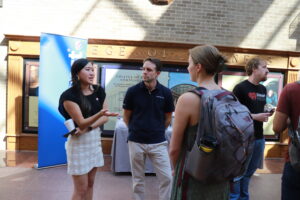
“These programs typically run for 12 weeks during the summer,” he said. “Most are paid and it’s a way for a company to have a long and intense look at the candidates. Many companies only offer full-time opportunities to those students who have completed an internship with their organization. So for many large firms, this is the path into their company.”
When a student is looking for an internship, COBA Associate Dean Andy Little said one thing stands above all when he advises a student on a potential position.
“Fit,” he said succinctly. “In other words, does this organization fit your values and the goals you have set for yourself? Will you get practical experience? What kind of people work there? Is it an industry or market segment that you would like to start your career in?”
McCabe-Gossett agrees that finding an internship in a potential career field is an essential part of finding the right landing spot.
“I encourage students to focus on finding an internship in the industry they imagine as their future career,” she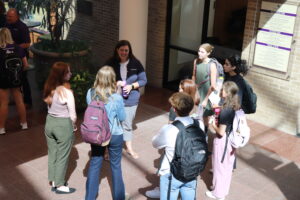 said. “Doing so will allow them to fully immerse themselves so they can determine whether or not their dream industry aligns with their values, work style, etc.”
said. “Doing so will allow them to fully immerse themselves so they can determine whether or not their dream industry aligns with their values, work style, etc.”
The National Association of Colleges and Employers has surveyed employers and determined the following qualities are most important to the potential employers surveyed. In order of importance, those qualities are:
- Problem-solving (critical thinking)
- Teamwork / collaboration
- Professionalism / work ethic
- Verbal and written communication skills
- Digital technology capabilities
- Leadership
- Global / multicultural fluency
“We want our students to demonstrate these competencies and reflect on their current areas of strength and areas where growth is needed,” Johnston said. “Their internship manager completes a formal evaluation that provides feedback on these key qualities.
“Another key advantage we are looking to provide for ACU students is an opportunity to intern with ACU alumni,” he said. “Our alumni teach students how professional excellence provides another avenue to honor God, as we serve in the marketplace.”
If you’d like to know more about internships with COBA, as either an employer or a student, email coba@acu.edu.
by M. C. Jennings | Oct 12, 2022 | Academics, Accounting, COBA Faculty, College Decisions, Current Students, Economics, Faith Infusion, Financial Management, Human Resource Management, International Business, Management, Management Information Systems, Marketing, Professional Development, Uncategorized
Written by special contributor Lance Fleming
The College of Business Administration (COBA) recently undertook what Dr. Brad Crisp considers “the most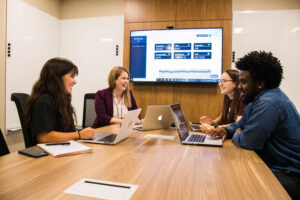 significant change to business curricula at ACU in at least three decades” with revisions to the Bachelor of Business Administration (BBA) majors.
significant change to business curricula at ACU in at least three decades” with revisions to the Bachelor of Business Administration (BBA) majors.
Those changes include updates to the core requirements for all business majors and to the major requirements for each business major, including an analytics track available within each major. The process that was undertaken was extensive and lasted a few years, including input from the COBA Dean’s Council, Visiting Committees, and other external stakeholders.
The members of each of those committees and groups were looking at in-depth benchmarking, analysis, and solution alternatives identified by the BBA Task Force. Those committees undertook extensive discussions on a wide range of proposals from the faculty task force, which was formed in early 2019 and delivered its recommendations later that fall. After the committees did their work, the changes were approved last spring by faculty and administrators at all levels of the university.
The goal of the core revision largely focused on faith and ethics, analytics and technology, and professional development.
“Faith and ethics are central to our identity as a Christian university,” said Dr. Crisp, the Dean of the College of Business Administration, “and we added some ethics content to a required business law course. All business majors will now take a two-course sequence in analytics and can choose a nine-hour or more track in analytics. Finally, we are placing greater emphasis on professional development by requiring a professional internship in management, marketing, and information systems and offering an internship as an option for accounting and finance majors.”

Photo by Jeremy Enlow
Those recommendations and changes are part of COBA keeping up with the pace of change that is currently being seen in the business world, said Andy Little, associate dean for COBA and associate professor of Business Law.
“The pace of change in the business world – and society in general – necessitates some level of change in two dimensions: first within a specific course, faculty need to stay up to date with new developments; and second, from time to time, the curriculum in general needs to be evaluated and potentially updated,” Little said. “It’s easy for most faculty to update specific courses on a regular basis. I’ve added three new readings to my introductory law class, all of which deal with recent developments in the legislature.
“Maybe more clearly, a course like Digital Marketing requires near-constant revision, just to keep up with all the changes in how people and companies use platforms to market products and services,” he said. “To a certain extent, the velocity of change works in favor of a stable curriculum: foundational subjects like Accounting, Economics, and Statistics need to be included in every iteration of a core curriculum over time because those are the building blocks on which much of the business enterprise rests.”
Every major was reviewed and now has more market aligned pathways giving students more direction and professional guidance as they look toward their future profession. As the business world evolves, COBA is continually looking for ways to prepare students both inside and outside of the classroom. We do this through holistic student development, offering foundational business courses and major specific tracks, and including ethics in our offerings. This combination helps us strive to produce graduates who honor God and bless the world.
To learn more about the College of Business at ACU, click here.
 Most trips to New York City involve plenty of sightseeing, tours, shows and musicals, and expensive trips to some of the world’s best restaurants. They don’t usually involve sit-down meetings with some of the top financial minds in the country. But that was the design of a trip to New York last fall for eight students in ACU’s Dukes School of Finance.
Most trips to New York City involve plenty of sightseeing, tours, shows and musicals, and expensive trips to some of the world’s best restaurants. They don’t usually involve sit-down meetings with some of the top financial minds in the country. But that was the design of a trip to New York last fall for eight students in ACU’s Dukes School of Finance.  Canada (RBC) was great for them,” he said. “We went into RBC, where they set us up in the conference room, and we had people talking to us who were dealing in high-level investments and acquisitions daily.
Canada (RBC) was great for them,” he said. “We went into RBC, where they set us up in the conference room, and we had people talking to us who were dealing in high-level investments and acquisitions daily.  Stewart said he always gets help from ACU alums in the financial industry, using their connections and contacts with industry leaders in New York to set up the trip. One of those ACU graduates who helped this year was COBA alum Steve Swinney (‘94), based in Colorado and the CEO of Kodiak Building Partners who tapped his contacts in New York to meet with students from his alma mater.
Stewart said he always gets help from ACU alums in the financial industry, using their connections and contacts with industry leaders in New York to set up the trip. One of those ACU graduates who helped this year was COBA alum Steve Swinney (‘94), based in Colorado and the CEO of Kodiak Building Partners who tapped his contacts in New York to meet with students from his alma mater.  Dallas because there are so many perspectives and different points of view in a big city than in a place like Abilene,” Stewart said. “But to see there’s a place for Christian businessmen and businesswomen to function and contribute and be part of that world was, hopefully, a healthy opportunity for our students.”
Dallas because there are so many perspectives and different points of view in a big city than in a place like Abilene,” Stewart said. “But to see there’s a place for Christian businessmen and businesswomen to function and contribute and be part of that world was, hopefully, a healthy opportunity for our students.”  “We wanted the students to make real connections, and when you have eight students sitting in a room with three or four investment bankers, that’s a great opportunity,” Stewart said. “They had a real chance to talk to them, to exchange business cards, and network. There are so many stereotypes of New York, but it’s one of the world’s great cities, and having the experience of moving around and riding the subway and seeing the landmarks and everything that goes along with New York City was so much fun to share with those students. We see the cutthroat part of the financial industry in the movies and on TV all the time, and some of that is probably true. But many people are out there doing things the right way and have a faith background and a belief system, and they put that in action every day.”
“We wanted the students to make real connections, and when you have eight students sitting in a room with three or four investment bankers, that’s a great opportunity,” Stewart said. “They had a real chance to talk to them, to exchange business cards, and network. There are so many stereotypes of New York, but it’s one of the world’s great cities, and having the experience of moving around and riding the subway and seeing the landmarks and everything that goes along with New York City was so much fun to share with those students. We see the cutthroat part of the financial industry in the movies and on TV all the time, and some of that is probably true. But many people are out there doing things the right way and have a faith background and a belief system, and they put that in action every day.”  Swearingen, and Jim Litton (‘01) for their help in setting up the schedule of tours and visits. “It’s the heart of the financial world, especially in our country. I learn something new on every trip, and I come back energized, inspired, and thinking about ways I can incorporate what we’ve learned on the trips into what we’re learning in the classroom. It inspires me to stand in front of our students and encourage them to dream big and do what they want to do because they can make it happen. We are fortunate to have many people here and ACU friends and family willing to help make that happen.”
Swearingen, and Jim Litton (‘01) for their help in setting up the schedule of tours and visits. “It’s the heart of the financial world, especially in our country. I learn something new on every trip, and I come back energized, inspired, and thinking about ways I can incorporate what we’ve learned on the trips into what we’re learning in the classroom. It inspires me to stand in front of our students and encourage them to dream big and do what they want to do because they can make it happen. We are fortunate to have many people here and ACU friends and family willing to help make that happen.”

 the best part of that internship the chance to improve his communication skills. But for ACU senior finance major Will Fargason, that was his favorite part of working during the summer for S-S Bendure Hartwig, one of the fastest-growing firms representing American Income Life branch of Globe Life Insurance.
the best part of that internship the chance to improve his communication skills. But for ACU senior finance major Will Fargason, that was his favorite part of working during the summer for S-S Bendure Hartwig, one of the fastest-growing firms representing American Income Life branch of Globe Life Insurance. We will highlight each of the seven over the next month, including this profile of Kathryn Crawford. A native of Flower Mound, Texas, Kathryn carries a 4.0 GPA and is graduating with a BBA degree double majoring in Financial Management and Management with a concentration in Leadership. After graduation, she will travel this summer and serve as a Resident Advisor for the Leipzig Study Abroad program.
We will highlight each of the seven over the next month, including this profile of Kathryn Crawford. A native of Flower Mound, Texas, Kathryn carries a 4.0 GPA and is graduating with a BBA degree double majoring in Financial Management and Management with a concentration in Leadership. After graduation, she will travel this summer and serve as a Resident Advisor for the Leipzig Study Abroad program.
 first year as the Professional Development and Internship Director for COBA. “Students have the distinct opportunity to apply what can feel like abstract theories and case studies to the real world. Internships are insulated and allow students to practice in an environment designed for them to ask questions and fail, whereas, post-graduate opportunities can be far less forgiving.”
first year as the Professional Development and Internship Director for COBA. “Students have the distinct opportunity to apply what can feel like abstract theories and case studies to the real world. Internships are insulated and allow students to practice in an environment designed for them to ask questions and fail, whereas, post-graduate opportunities can be far less forgiving.”
 said. “Doing so will allow them to fully immerse themselves so they can determine whether or not their dream industry aligns with their values, work style, etc.”
said. “Doing so will allow them to fully immerse themselves so they can determine whether or not their dream industry aligns with their values, work style, etc.” significant change to business curricula at ACU in at least three decades” with revisions to the Bachelor of Business Administration (BBA) majors.
significant change to business curricula at ACU in at least three decades” with revisions to the Bachelor of Business Administration (BBA) majors.